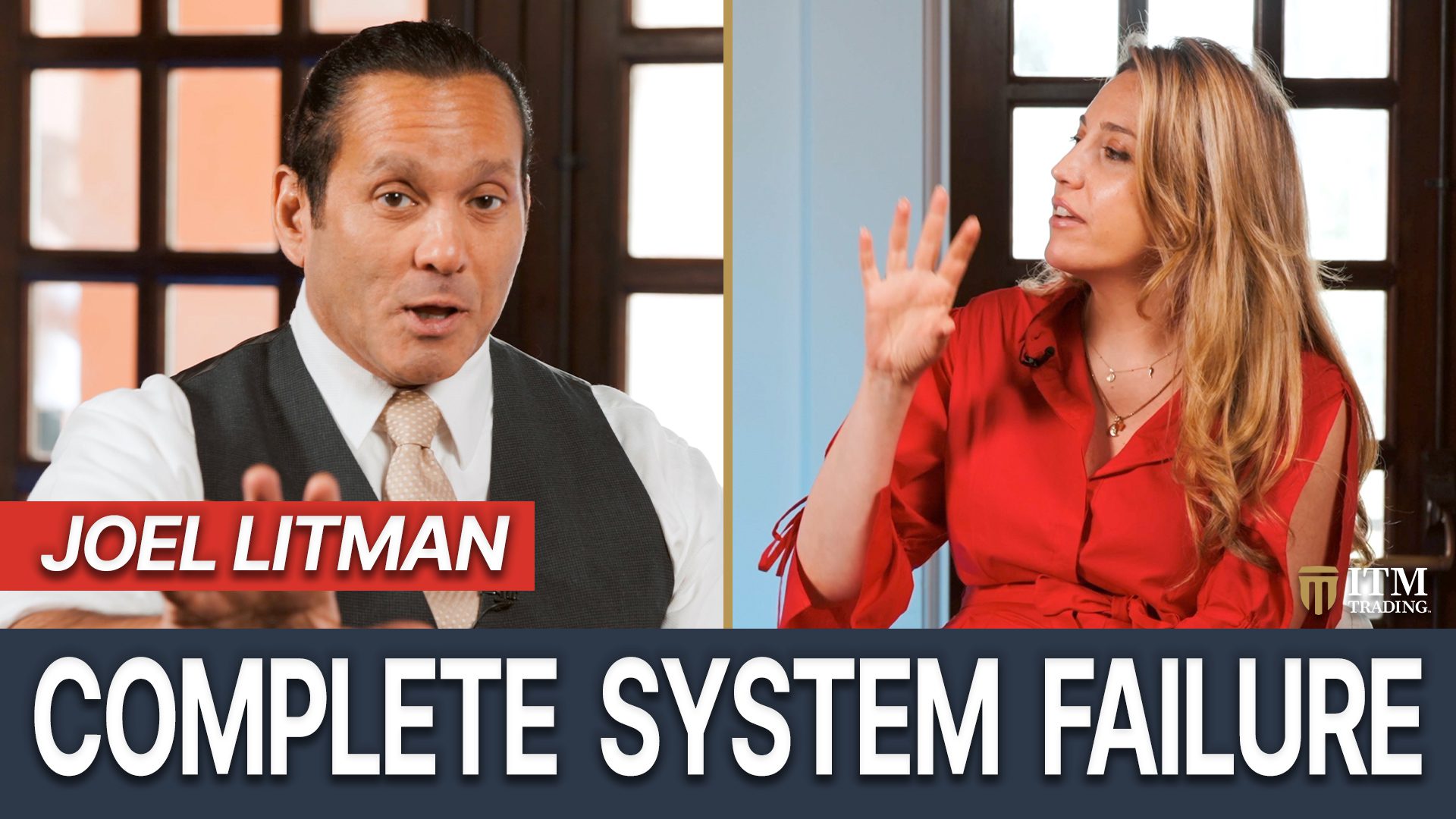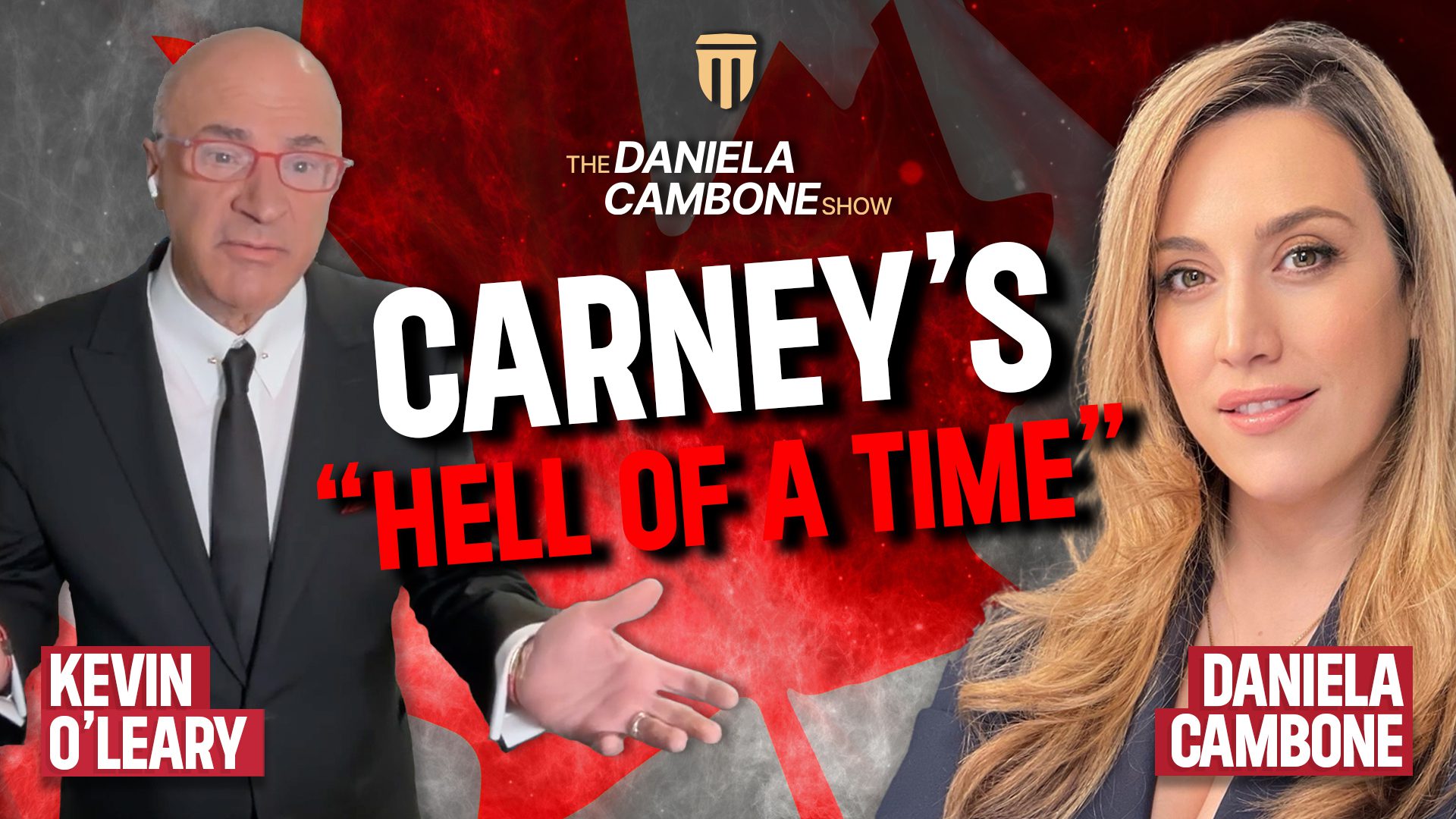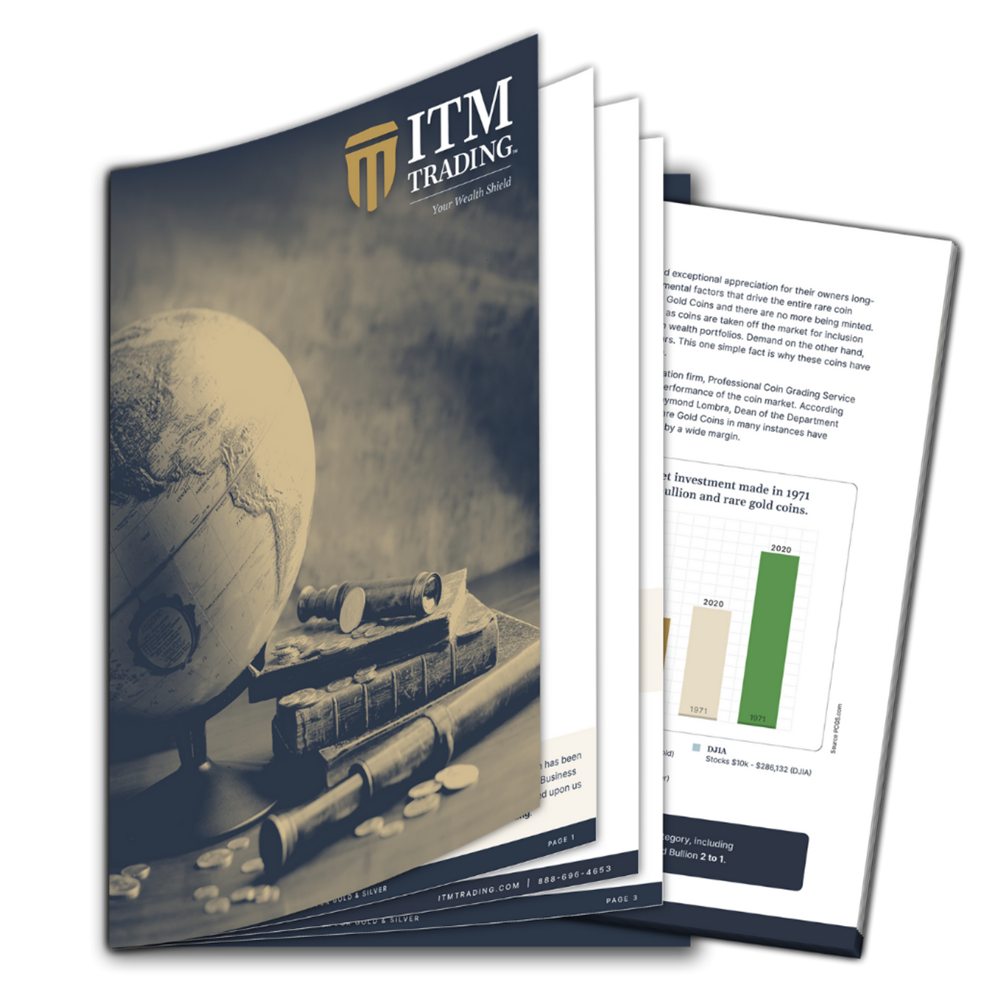As U.S. Debt Hits Historic Levels, How Close Are We to a Complete System Failure?

The U.S. deficit will become worrisome if tax revenue collected by the government falls far short of, or gets too close to, the debt service, claims Joel Litman, President and CEO of Valens Research. However, he remains optimistic about the overall U.S. economy. “U.S. assets are easily 50 trillion at the lowest end, probably closer to 100 trillion. The U.S. government is still the biggest landowner of U.S. land in the United States,” he states. Furthermore, Litman provides a clear and informed perspective on why the U.S. remains financially resilient and what measures could ensure continued economic stability. Don’t miss this insightful analysis that challenges common alarmist views and offers a deeper understanding of national debt dynamics.
CHAPTERS:
00:00 US debt
5:52 The breaking point of US debt
7:53 Servicing the debt
11:04 Warren Buffet ends deficit in 5 minutes
16:01 Diminishing purchasing power
17:52 Real estate
TRANSCRIPT FROM VIDEO:
00:00
So you think the multiple economists, experts, IMF, sounding the alarm bell is just because they simply don’t understand? Are these experts accountants? I don’t think so. So you are an accountant. Yes, I’m an accountant. My firm is full of accountants. I mean, the IMF, I would think that there’s certain accountants. It doesn’t sound like it because the way they do things, it certainly seems like a lot of things that the IMF does doesn’t have anything to do with accounting or whatever else that’s more political. But no, like if you’re saying, why don’t wipe away the debt if it’s so simple? No, it’s not that they could wipe away the debt. It’s that they can service the debt without any problem.
00:29
Why do you think they’re hesitant to do so? Because there’s no need to. If the amount of money the government’s collecting is more than enough to service the debt, why would you be a debt-free? I really hope that that will pass out, Joel. But that’s the way it is right now. Okay. So saying that already we’re in a crisis, I’m like, no, we’re not. No, we’re not. I was saying, but we will be in a crisis. I’m like, I agree we could be.
00:58
Hi, this is Daniela Cambone. Welcome back to the Daniela Cambone show on the road from Boca Raton. We are at the Rick Ruhl Symposium, one of the best attended events in the natural resources sector and joined by my good old friend that I just love to debate over and over, Joel Litman of Altimetry Research. Joel! I’ve missed you. Thanks to have me. Thanks to have me here. Congratulations on the birth of your…
01:26
your son. My boy, yeah. Four and a half months old. We have Aaron with us on the sidelines today, your other boy. So nice to have the family in the house. I couldn’t wait to get you on, because guess what we’re going to talk about today? What would you like? I want to talk about the U.S. debt, something that you and I have debated at Nausium, but it’s resurfaced now because the debt is now reaching record levels, raising concerns that we are about to enter a severe debt crisis. Yeah.
01:56
34 trillion, what? I’m sorry to be the bearer of good news, but yeah, it’s just nowhere near as bad a thing as people are saying. The data just shows that it’s not as bad. Okay. So this is, I want you to break it down. And I’m open to hearing what you have to say. But how is 34 trillion in debt? And the IMF even warning that, hey, the US has to get things in order because a crisis is going to happen. Even…
02:22
Mike Pompeo saying this cannot go on. It’s an unsustainable trajectory. So many experts sounding the alarm bell. Are these experts accountants? I don’t think so. So you are an accountant. Yes, I’m an accountant. My firm is full of accountants. I mean, the IMF, I would think that there’s certain accountants at the… It doesn’t sound like it, because the way they do things, it certainly seems like a lot of things that the IMF doesn’t have anything to do with accounting or whatever else that’s more political. Truth, but no, but I want to hear your take of how you think we get out of this. Well, so…
02:47
The biggest thing is that people keep talking about, and what the IMF and they say is a debt to GDP ratio, which is an irrelevant metric for the United States because the U.S., or any country, countries cannot spend GDP. So when you’re saying, I have a lot of debt, you have to say, well, where does the country get its cash flow? A country, think of it like a company doing credit analysis, what is the amount of cash the country generates relative to its debt service? Well, you could do those numbers. And the United States doesn’t tax U.S. GDP. The U.S. taxes the world.
03:17
This is unique. So if you’re going to use GDP as a number for the US, you’d use global GDP because the US taxes the world. The US, how do I mean that? Well, the US taxes corporations. Corporations pay income tax. That income tax is where cash is then used to pay off the debt service, right? And so when you think of that, which this year is going to be $4.8 trillion, I mean, think about it, $4.8 trillion. All of Russia pre the Russia-Ukraine war,
03:45
collected maybe $350 billion in taxes, maybe 350. The US is collecting 4.8 trillion, and on a tax rate that’s lower than China, or lower than Russia, or lower than most of the countries in Europe. So on a lower tax rate, the United States collects a lot more in tax revenue. And the reason is because the US taxes the world. Every time someone in India buys a Pepsi, that results in Pepsi companies earnings, which results in taxation, which goes to the US government.
04:13
to fund the US’s debt service. Every time someone in Germany buys a Coca-Cola, that results in a profit in the United States that results in taxable income in the United States that the government taxes. And so when you look at the US, because half of the S&P 500’s revenue is, 40 to 50% of the S&P 500’s revenue and earnings is international, non-US. The US doesn’t just tax corporate profit from the US, they tax global profit. The US also, which is unique, taxes every American
04:42
me, you, everyone, on our global income. That’s unique. No other country in the world does that. So the fact that they tax global income, and frankly, at a lower rate than Russia or China or any of these other countries, the US actually collects more in taxes. 4.8 trillion, what is the debt service this year? Around 860 billion. To pay off 860 billion, which is a debt service on 34 trillion, that’s at current rates, by the way. That’s at current rates. Relative to the cash that comes in, it’s a no-brainer.
05:12
Meaning, the data says, this is why when the fed says, sorry, when the fed, when the treasury says, we’re going to issue debt, we’re going to issue treasuries, it’s three times oversubscribed. Why? Because it’s good money. Right? Now, is Congress grossly overspending in all kinds of places? Absolutely. I think those meatheads, most of whom are attorneys, not accountants, and not business people, and not entrepreneurs, right, that don’t really understand how business works, I think they’ll keep spending. But the gross overspending of Congress has been
05:41
bailed out by the strength of the US economy, given the US economy is really a globally taxed economy in a way that no other country in the world benefits from. Okay. In the same way. Thank you for stating that. Now, let me rephrase the question. Yes. At one point, does it become, is there a point that you get worried that there is too much debt? When does too much debt become a problem for you? What’s the number?
06:09
Is there a number? There is. At some point, if the tax revenue the government’s collected is far less or getting too close to what the debt service is, but right now, again, call it $5 trillion versus call it a trillion, you’re still at five times. And then when you look at US assets, right? So every credit state, if you were a bank, you’d say, all right, well, what if you have a bad year for collecting taxes?
06:36
What are your assets? US assets are easily $50 trillion on the lowest, lowest end. Probably closer to 100. US government is still the biggest landowner of US land in the United States. If you privatize the Amtrak, if you privatize the Post Office, if you privatize the US highway system, if you privatize, which companies do, taking government buildings and do a sale lease back and letting some REIT own it and just paying rent instead of taking it, you could raise more than enough money to cover the $34 trillion. Not to mention US receivables from other countries.
07:04
The other countries of the US is in the trillions also. So if you start looking at net debt numbers and the total amount, it really isn’t that bad now. And how do we know it? Because every time the government says, we’re gonna float US treasuries, it’s three times oversubscribed. More than enough money people will say, at four and a half percent, dollars denominated, I will take that. So you think the multiple economist experts, IMF sounding the alarm bell is just because they simply don’t.
07:29
Understand? It’s interesting. I think it’s good they’re doing it because the politicians, the US Congress, I don’t want them to hear what I’m saying, by the way, trust me, right? The US Congress is overspending, they grossly overspend, but the US economy has grown so much that the tax revenue, again, on a lower tax rate than most other countries, right, has allowed for the US to have more than enough money to pay off the irresponsibility of Congress. Let’s talk facts. Okay, so as of April 2024,
07:57
about 39 cents of every dollar paid and personal income taxes is going toward paying down the interest on the national debt. That’s not true. I’m sorry. Every 40 cents of every… Oh, of personal income tax. Yes. Yes. Of every dollar. That’s if you don’t take any money from corporate income taxes. You don’t take your money from other places, government tax. You don’t take any money from capital gains. But we’re already paying 40 cents on every dollar. So this is a growing portion. That’s 40 cents if you only took money from individuals. Yes. But the US has other ways of making…
08:23
But hold on, but I’m saying this is a growing portion of the federal budget and could surpass Medicare and defense spending in 2024. My point is, if they’re already taking all this money, it’s still not making a dent. Like, why aren’t they servicing the debt? Why are they still taking more money? Meaning, why are they still have a deficit? Like, if you’re saying, why not wipe away the debt if it’s so simple? No, it’s not that they could wipe away the debt, it’s that they can service the debt without any problem. So why, yeah, then why do you think they’re hesitant to do so?
08:51
Because there’s no need to, if the amount of money the government’s collecting is more than enough to service the debt, why would you be debt free? Why wouldn’t Coca-Cola be debt free right now? Right, why does Coca-Cola have leverage? Why does Pepsi have leverage? Because optimal cap structure says, instead of paying down that debt, it’s better that we have that money left over for doing more things. Well, that’s what it says, it says service the debt, service the debt service that you need, which is 860 billion and probably rising to a trillion.
09:16
But at that point in time, the 4.8 trillion tax revenue is also rising. Let me ask you this. All right, OK, so if you’re not concerned about the debt right now, but are you concerned? I’m not now. Not now. Would I be concerned in five years or ten years? Maybe. Yes, based on the irresponsibility of Congress. OK, so let’s talk about that. Are you a little concerned? I mean, it struck me at least that during the presidential debate, there’s no talk of debt. There’s been no talk of the debt, right? So are you afraid that it’s not top of mind for…
09:44
any politician coming into the White House? I mean, should it be? Keeping the deficits down is important, but paying down the debt isn’t a good spend of US money. So let’s look at it this way. If the US government has a deficit of a trillion dollars, how much does it cost to service that trillion dollars? $50 billion, 50 billion. So out of a $4.8 trillion tax revenue, right, that the federal government collects, you have to put aside just 50 billion.
10:13
for covering an extra trillion dollars. Now, if that trillion is just a handout, it’s pandemic, everybody gets $2,000, that is inflationary, that’s bad, and there’s no way the government collects 50 billion in taxes to pay for that. But if the trillion dollars put towards things like way back when, dams, infrastructure, highway system, or today, what a lot of it’s going towards, which is building and bringing manufacturing back to the United States,
10:39
in so many ways, right, whether we’re talking about the BIL, the bipartisan infrastructure law, or the Chips Act or whatever else. If those things result, if a trillion dollars is spending results in the government collecting another 50 billion in taxes because the economy grows that much because of it, not just the economy, but the profits of companies and incomes of people grow because of it, then why wouldn’t you take another trillion? That’s actually very smart optimal cap structure. What about…
11:02
this solution that Warren Buffett proposed back in 2011. I dug it up for you. He says, I could end the deficit in five minutes. You just passed a law that says that anytime there’s a deficit of more than 3% of GDP, all sitting members of Congress are ineligible for reelection. So one, they should be ineligible for reelection, and two, they should be ineligible from trading stocks against the bills, right? The Pelosi. So one of the things that we do now is we actually track 10 to 20 politicians who have…
11:30
proven track record of beating the stock market like Pelosi to see what they’re buying. Thank goodness that’s actually shown, but that’s where they make the real money, right? Absolutely. Is by putting against that. And so, yeah, there’s a certain optimal cap structure that says for the US government, just like any company, that good credit analysis would do. And doing that credit analysis right now says this is why the US is still AAA. If I’m wrong, why is it that every time- Well, you say it’s AAA. Credit agencies would-
11:59
Who, Fitch? Oh, that’s a headline nonsense thing that Fitch is trying to make headlines. If the US is in AAA, why is it when they float debt at their rate, they triple oversubscribed? Why is the- Who is the largest buyer of US debt? I mean, it’s the world’s investors, but you’d argue that China has been- they’ve been saying that China has actually been selling, but if you look that- so China had like 1.4 trillion in US treasuries, and they fall into something like 800 billion.
12:24
But actually, if you look, they’re probably still buying as treasuries for a bunch of Belgian and European shadow companies. This is not conspiracy theory. There’s actually pretty good data on this. Forensic accounting would show that they’re still buying US treasuries heavily. But Japan, if they stop. And then Japan’s case. Right. What happens if Japan’s just like, yeah, we’re going to stop. We saw how the US intervened, kind of slapped them on the.
12:45
on the risk for being a currency manipulator. How about if Japan’s like, yeah, you know what, we’re not gonna. Well, Japan’s not buying two thirds of the treasuries. And if the treasuries are three times oversubscribed, okay, so if Japan drops out, there’s still two times oversubscribed. What happens if the Fed were to step in and become the buyer of last resort? Do you panic then? It depends on why they’re doing it. I’d have to understand why they’re doing it and what they’re doing to maintain it. But right now I’d still say that, no, investors on the world want dollar denominated.
13:14
risk-free rate of income and at four and a half percent or anything between four and five percent they’ll take that all day long. But it has to stay between it has to stay at five percent in order for that to work. I don’t think the fed’s cutting rates anytime soon. I think that as long as Powell has unemployment levels as low as they are even though directionally they’re not as good as you’d like but they’re still really low compared to the rest of the world I think he will keep punching on inflation all day long. Let’s pivot bring up Rick Rule.
13:40
the man behind the conference we’re at. So he’ll compare this time that we’re living in to what happened post-Vietnam, the amount of debt that was created. And he says the only way that we were able to get out of it then was the devaluation of the currency of the U.S. dollar. And he says, he would argue, that’s the only way to get out of this debt now. So I don’t think the U.S. economy had the strength that it has now where the U.S. economy today, U.S. corporate earnings,
14:09
When you do this under uniform accounting, you have to do uniform accounting, GAP accounting and the Wall Street numbers are such nonsense. But under uniform accounting, where you put the same accounting under the whole world, the US corporations earn more in earnings than all the rest of the world combined. All the rest of the world’s companies combined earn less by something like three times less than what the US earns corporate earnings. And so when you look at that strength and the fact that that is taxable number, so you could tax that number and it does not result in companies shrinking.
14:39
because you’re taxing profits, you’re not taxing revenue. Well, because of that, you could see, I mean, right now at $4.8 trillion, the US tax revenue is more than the next 10 or 15 countries combined. That number should be around 7.5 trillion sometime in the next 10 years, where you’re literally looking at the US collecting more in taxes than the rest of the world’s countries combined on a lower tax rate than many of those countries. And when you have that kind of money, that is your bailout.
15:06
So I’m not saying the, of course Congress is irresponsible whenever they overspend with handouts and overspend in ways that aren’t really building the economy or leading to jobs or leading to more income. If they’re just spending money as a handout, that’s of course inflationary and bad. But when they’re spending on things like the BIL and the Chips Act and whatever else that are bringing business and economy back, you’d argue that will result in more income, better lives for people, and more taxes collected with which to pay off those deficits. So-
15:36
Pat out, Joel. I hope so, too. But that’s the way it is right now. So saying that already we’re in a crisis, I’m like, no, we’re not. No, we’re not. And I was saying, but we will be in a crisis. I’m like, I agree we could be. And so we have to look at, just like you look at anyone’s income, how fast is the person’s debt increasing relative to how fast their income’s increasing? And if their income’s increasing wildly, well, then you can increase your debt levels. Let’s talk purchasing power for a second, because the purchasing power of the US dollar has diminished over 50% from 2020. Yes. OK.
16:05
What trajectory are we on? Well, part of that’s monetary policy, right? When you have zero percentage rates, and part of that is fiscal, not fiscal, but I’ll say government welfare policy. We just hand people money, right? Like crazy. So that is always gonna be inflationary. No question, right? Number two, part of it is a less China, less US, less Russia, globalized world. And so when you don’t have Russia’s cheap oil, Russia’s cheap gas, Russia’s cheap aluminum, and all kinds of other stuff that Russia provides.
16:34
And you don’t have the Ukraine’s breadbasket of the world. Ukraine was the number one wheat producer. Wheat’s the number of calorie ingested in the world. And you put China and how they’re absolutely corrupt, Xi Jinping, the current Hitler of the world. I mean, the things he’s doing are just atrocious. You take Xi Jinping and how Chinese people can’t wait to get out, wish they could move their money into dollars. He shut down companies buying dollars. Well, they’re moving it into gold. What’s that? They’re moving into gold. They’re moving into gold because they don’t have a choice.
17:04
They prefer to move into dollars. I mean, they’re moving to gold, but they tried moving to dollars, and they can’t. So they got to move to things like physical gold, which is not an easy thing to do. But they’re doing it to protect themselves from the actual collapse of the RMB. So when you look at this, you say, not China, less Russia. Of course, things are going to get more inflationary. Of course. But that’s not all because of QE or monetary policy. Some of it was monetary policy. Some of it was QE policy. But the monetary policy of 5% is a good long-term nice interest rate. 2.5%, you’d call real risk-free rate of return.
17:33
plus inflation, you’re at something like five, five and a half, and that’s a good number for the world, for the US to stay at. So let’s wrap with this. You’re a keynote speaker here at Rick Ruhl’s symposium. So if the debt doesn’t keep you up at night, I want to ask Joel Littman, is there any pocket in the economy that you’re looking at and thinking, yeah, that’s a red flag for me? Well, I mean, commercial real estate’s dead for the next like five to 10 years. This is not just a recession for them, it’s a depression. Time to scoop it up? No. Stay away.
18:02
No, no, no, no, this is a demographic shift. This is not just higher interest rates that are punishing real estate. It’s the fact that people aren’t living in offices anymore. That’s going to continue and grow. That’s not going to go away anytime soon. And so as long as that’s the case, real estate’s dead. I think autos are in trouble. I think anything that China is dumping on, they’re dumping on EVs. They destroyed the solar panel market of the world because they did predatory pricing there. I hope the US tariffs will stem some of that. But the tariffs at 100% on Chinese EVs.
18:31
may not be enough given how cheap and how heavily subsidized those are. So there are pockets that are bad, but in general, the S&P 500, right, over the next five, 10, 15 years, is gonna outperform gold, is gonna outperform any metals, is gonna outperform any bond market, and it’s gonna be a nice place to be. I wouldn’t put all your money in the S&P right now, right, given the prices, but I would start legging it over 18 months. You do that over 18 months. Wow, so you’re still bullish, the S&P. I wasn’t as much a year ago, but we are now. I mean, because the earnings are at…
19:00
All right, the stock market is at all time highs. Well, so are earnings. And balance sheets of US companies are unbelievably safe. Talk about US corporate debt, right? They have managed their debt service in ways that are far better than US government has. And that it’s just, it’s a very, very safe balance sheet so you can see from the CDS markets and from debt flow. Now that we’re on the topic, you know I’m gonna have to ask the question because I get it all the time. Well, what does Joel do with a company like Nvidia? With Nvidia? Yeah, what do you do with that?
19:25
I mean, I’m buying the S&P 500, so you’re getting a big chunk of it in the S&P already. Do you want more than that? I don’t think I want more than I’m already getting in the S&P, but I’m not going to buy the S&P and short Nvidia at the same time. I’d say let it ride in there with everything else. But what sectors do you specifically like in the S&P? No, I just like the S&P in general. Just in general? Yeah, I mean, it’s not… There’s specific stocks I love that would say buy it, and that’s people that subscribe to my…
19:50
Subscribe to my research. We’ve got 20 or 30 good names at Ultimetry that I love, but we’re very single stock specific. There’s no sector that I just say I love. Well, you do really good research over there. Oh, thank you. And I love having you on the show and battling it out with you. Thank you for coming back on, and we’ll see you soon. Yeah, I created a link. It’s ultimetrymacro.com.
20:15
Check them out. Check out your subscribers. I mean, your viewers will get a special deal. Ah, there you go. Your gift for us. Thank you. All right. Well, we’ll see you on the boat cruise tonight. Joel’s going to be doing a talk there. Yeah. They’re giving me a breakout session on the boat. We’ll see how that goes. Well, I’ll be on that boat and hopefully great. Well, we’ll still be afloat. Yes. All right. We’ll have more great content. We’re just starting our coverage here at the Rick Roll Symposium. So be sure to stay tuned to the Daniela Cambone show here on ITM Trading.
20:43
And don’t forget to sign up at danielacambone.com. Stay tuned.














